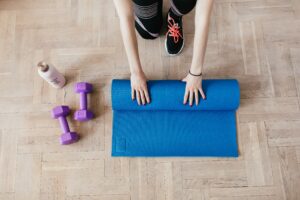Constipation is a common complaint during and after pregnancy. Its symptoms may include infrequent defecation, hard stools or excessive straining. It has been estimated that approximately 11% to 38% of pregnant women experience constipation.
Symptoms:
-
Passing fewer than three stools a week.
-
Having lumpy or hard stools.
-
Straining to have bowel movements.
-
Feeling as though there’s a blockage in your rectum that prevents bowel movements.
-
Feeling as though you can’t completely empty the stool from your rectum.
-
Needing help to empty your rectum, such as using your hands to press on your abdomen.
-
It is important to note that constipation negatively affects patients’ daily lives and is second only to nausea as the most common gastrointestinal complaint in pregnancy.
Causes:
-
Changes in hormones. Rising progesterone levels during pregnancy and reduced motilin hormone levels lead to increases in bowel transit time.
-
Increased water absorption from the intestines causes the stool to dry out.
-
Decreased maternal activity and increased vitamin supplementation (eg, iron and calcium) can further contribute to constipation.
-
Later in pregnancy, an enlarging uterus might slow onward movement of faeces.
Here is what the evidence says about the treatment options for constipation:
Many patients find relief from constipation with an increase in dietary fibre and fluids, as well as daily exercise. This is your gold standard for initial treatment advice. Probiotics that alter the gut bacteria are another option that can also improve bowel function. If these options are ineffective, laxatives are the second line of therapy. Lets have a look at these options in more details:
Consume more fibre – According to the trusted resource What to Expect, You’ll need 25 to 30 grams of fibre per day while you’re expecting. Fibre has been proven to aid frequency of stools.
Try to include a mix of these four categories in your diet:
- fruit (apples, raspberries, pears)
- vegetables (broccoli, peas, artichokes)
- whole grains (brown rice, cooked barley)
- legumes (black beans, chickpeas, lentils)

Hydrate – According to the American College of Obstetricians and Gynaecologists, during pregnancy you should drink 8 to 12 cups (64 to 96 ounces) of water every day. Water has many benefits. It aids digestion and helps form the amniotic fluid around the foetus. Water also helps nutrients circulate in the body and helps waste leave the body.

Exercise – Guidelines recommend women with no medical contraindications perform at least 20 to 30 minutes per day of aerobic and / or strength-conditioning exercise before, during, and after pregnancy. There is a lot of evidence when it comes to the benefits of exercise on gut health.

Pilates – This is one of our favourite forms on exercise when it come to gut health. Pilates is low impact but targets the whole body (with a little extra emphasis on the pelvic floor and core muscle groups). It helps to keep you moving but has been proven to be safe in all stages of pregnancy (and can be started as early as 6 weeks post-birth). Have a look at our Top 5 Online Pilates options here.
Yoga – Another great prenatal and postnatal exercise option is Yoga. Yoga uses body weight and flexibility to build strength and fitness in a safe and enjoyable way. It can help with bowel movements as it enables the body to create space in the abdominal region and stretch the tissues that might otherwise be quite sedentary throughout the day (especially with desk work).
There are lots of Online Yoga programmes available, have a look at our Top 5 here (and why we love them)!

Probiotics – This study found that probiotics might improve whole gut transit time, stool frequency, and stool consistency and this 2019 review found that taking probiotics for 2 weeks helped to treat constipation, increasing stool frequency and stool consistency. Speak to your healthcare provider about this treatment option to make sure it is right for you and where you are on your pregnancy journey.
Read more about how probiotics can help and which ones are best to take here and have a look at our top picks of probiotics here.
Laxatives – If none of the above help with your constipation symptoms then please speak to your GP regarding laxatives. It has been reported that, because most laxatives are not absorbed systemically, short-term use has not been, and is not expected to be, associated with an increased risk to the unborn baby.

Complications associated with constipation:
- Straining when you have a bowel movement may cause swelling in the veins in and around your anus (known as haemorrhoids).
- A large or hard stool can cause tiny tears in the anus (fissure).
- Chronic constipation may cause an accumulation of hardened stool that gets stuck in your intestines and becomes painful.
- Straining to have a bowel movement can cause a small amount of the rectum to stretch and protrude from the anus (prolapse).
Also tell your doctor or midwife if you have any of the following symptoms:
- nausea.
- stomach pain.
- vomiting.
- constipation that lasts for longer than 1–2 weeks.
- bleeding from the rectum.
- no relief after using a laxative.
It is vital that pregnant women speak with their doctor before taking any medication, including laxatives or other constipation remedies.

